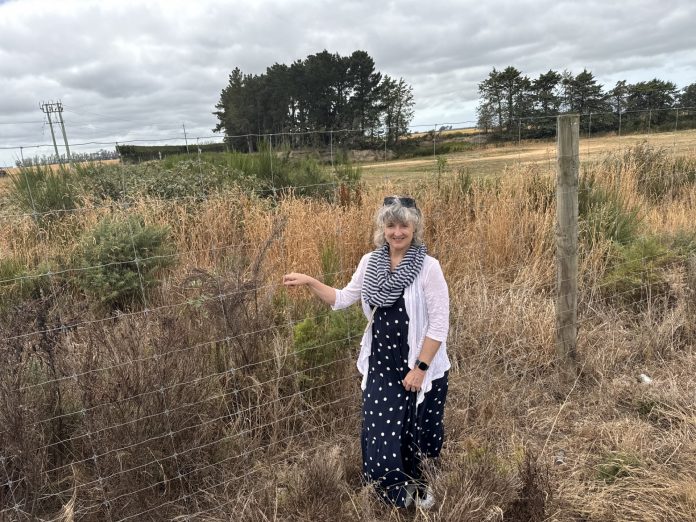
Pendarves farmer Sarndra Jaine-Vanderweg is surprised her dream of having a neighbouring weed-infested old shingle pit transformed into an area with native bush will finally be realised.
Jaine-Vanderweg and husband Graham farm next door to the 1.4ha pit, owned by the district council, on the Pendarves corner.
Jaine-Vanderweg said her appeals to district council staff on several occasions in recent years about tidying up the pit’s overgrown weeds and planting natives had led nowhere.
But last week there was a breakthrough, when the district council responded to a query from The Ashburton Courier.
In a statement, group manager infrastructure and open spaces Neil McCann told the Courier the district council would be happy to work together with members of the Pendarves community who were wanting to see natives planted.
“We’d love to hear what Sarndra and the local community groups have in mind for native plantings at the shingle pit,’’ McCann said.
This followed the district council cleaning up the area from its overgrown state in recent months.
The pit has historically become overgrown with wilding pines and weeds such as gorse, broom and bramble. The clean up saw the district council remove wilding pines and clear the weeds from the centre so it could be used as a holding area for demolition waste in case of a natural disaster. It has put the pit on a regular mowing cycle.
Jaine-Vanderweg said while it was good to see the pit tidied up in this way, the periphery of gorse, broom and bramble remained an eyesore.
She and fellow local farmers, many of whom were planting natives on their own properties, would want to work with the district council to replace the weeds with natives.
The pit was across the road from both the Pendarves Volunteer Fire Brigade and the Pendarves Hall where Pendarves Young Farmers held its meetings. Committees of these organisations would also be keen to help. Hall committee members were planning to plant native tussocks and other plants at a new mound at the hall.
‘‘We are a strong community that would pull finger and get it planted,’’ Jaine-Vanderweg said.
‘‘If the council could get their act together, and we could plant the perimeters with tussock and other low growing natives.’’
The smaller plants would need to be on the corner area, to ensure visibility for motorists, while taller natives such as kowhai could also be planted along other areas.
Native plantings would help attract kereru, which visited Pendarves from time to time, as well as other natives such as tui, Jaine-Vanderweg said.
She believed once the area was sprayed off by the district council, the planting itself could be undertaken at minimal cost with grants potentially available.
Following the response to the Courier from the district council, Jaine-Vanderweg said she was ‘‘pleasantly surprised’’, and was looking forward to getting in touch with staff.
‘‘I think it’s wonderful,’’ she said.



